Opportunities to Target Senior Cats and Overweight Cats
by David Lummis
November 23, 2021
That senior and overweight pets represent a daunting health and wellness need as well as a business opportunity has not been lost on pet marketers, retailers, and service providers. Nevertheless, relative to the business of senior- or weight-targeted products and services on the human side, the pet industry still has a long way to go.
The share of cat-owning households with senior cats rose from 46% in 2011/12 to 54% as of 2020/21, nearly as sharp as the rise from 42% of dog owners in 2011/12 to 54% as of 2020/21.

Older pets mean more companion animals are suffering from age-related conditions, including joint, coronary, cognitive, and immune-system-related, as well as diabetes and cancer. Senior-targeted pet products cover all these needs as well as routine daily concerns, and because of their more specialized health focus, senior products and services are typically priced well above the market average. Older pet populations also drive human-style advancements in veterinary care, medications, and supplements supported by newer payment options such as pet insurance. Moreover, as pets age, the human/animal bond deepens, creating an increased willingness among pet owners to do whatever it takes to keep their pets healthy and happy for as long as possible.
In terms of overweight cats, the problem appears to be largely one of denial among pet owners that their dogs and cats are in fact overweight, to say nothing of obese.
Association for Pet Obesity Prevention data show that pet overweight/obesity affects roughly three in five dogs and cats, and as with numerous pet market dynamics, COVID-19 has accelerated the trend. Banfield Pet Hospital survey data as reported in the Wall Street Journal (March 4, 2021) show 42% of pet owners in October 2020 reporting that their pets had gained weight during the pandemic quarantine, up from 33% in May 2020.
Yet, in Packaged Facts’ February 2021 Survey of Pet Owners, just 21% of cat owners (and 14% of dog owners) acknowledged having an overweight pet. Breaking through this denial—think public-service-type television commercials—is essential to healthier weight pets and the further development of weight-focused pet food, treats, exercise toys, veterinary services, and training classes.
For more information about pet products and services for cats, see the newly published report Cats: U.S. Pet Market Trends and Opportunities by Packaged Facts.
About the blogger: David Lummis is a long-time Senior Analyst and Consultant focusing on the U.S. pet market for Packaged Facts.
Have unique research needs?
Freedonia Custom Research listens intently to your needs and objectives. Then we work diligently to define and deliver a service to meet them.Subscribe to Our Blog
Stay up to date with the latest information about new market research and news in areas relevant to your business from our analysts and team members.Packaged Facts Blog Subscription
Provide the following details to subscribe.